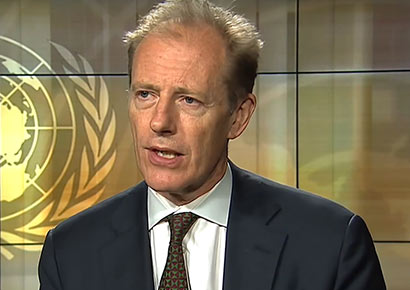UN rights chief | Myth that LGBTI equality is “Western agenda”

Andrew Gilmour (UN)
Ahead of Africa Day, the UN Assistant Secretary-General for Human Rights, Andrew Gilmour, says that LGBTI equality is not about imposing an agenda but about stopping discrimination.
Gilmour addressed the issue at The Economist’s Pride and Prejudice conference in London on Thursday. The event looked at the economic and human costs of discrimination against the LGBTI community.
“The LGBTI agenda in the West has made tremendous progress over the past 10-15 years, but [it] is suffering in many parts of the world. There is a big pushback, partly in reaction to success in the West,” noted Gilmour, reported Pink News.
He said that the claim that the West was imposing this on the rest of the world came up in a visit to central Asia last week.
“My response there was that we are not imposing or seeking to push a pro-LGBTI agenda,” Gilmour stated. “The Russian government in particular accuses the West – and indeed the UN – of imposing alien values on traditional Slavic cultures. That is a line they use, and they associate it with opposition to the Putin government and with the EU.
“That narrative is out there, but my line is that we’re not trying to impose a gay agenda. What we do oppose is discrimination,” he said.
Gilmour continued: “What we’re trying to do is push back against discrimination, and that is our line because it’s always easy to say, ‘The human rights agenda is a Western agenda,’ which it isn’t. There is this myth out there that human rights is a Western agenda, and some governments are very keen to propagate that myth.”
The claim that homosexuality or LGBTI equality are foreign concepts is often used by governments in Africa, and in other parts of the world, to justify the continued oppression and criminalisation of LGBTI people.
In his talk, Gilmour called on businesses to be more active in opposing LGBTI persecution and inequality, citing an example in Uganda.
“Uganda, as many people know, the government is one of the most hostile to LGBTI rights. We had a meeting there. A lot of the world’s biggest companies are in Kampala, but not one company dared show up. I take on board that you’ve got to be careful and protect your staff, but there’s taking caution too far, frankly.”
Gilmour cited another instance in the Middle East. “A major social network in the Gulf has just banned all LGBTI messages, but the same company is a great supporter of what we’re trying to do. You’ve got to stand up a little bit, particularly if you’re a huge company and you have the muscle to stand up.
“That company, I very much doubt would get blocked in the Gulf – it’s a global giant. As a general principle, I am in favour of companies standing up to that, because if they don’t, nobody else can,” he said.
Homosexuality is illegal in around 74 countries around the world, with punishment ranging from fines to life imprisonment and even the death penalty in eight states or regions.
A study released last month by the Williams Institute found that average levels of acceptance for LGBT people and rights have increased globally since 1980, but levels of acceptance have become more polarized. The researchers found that 80 countries (57%) experienced increases in acceptance, 46 countries (33%) experienced a decline in acceptance and 15 countries (11%) were unchanged.
The analysis showed that the most accepting countries have shown the greatest increase in LGBT acceptance since 1980 while, alarmingly, the least accepting countries have become less accepting over time.
“The analysis showed that the most accepting countries have shown the greatest increase in LGBT acceptance since 1980 while, alarmingly, the least accepting countries have become less accepting over time.” It just goes to show that in those countries where LGBTQI+ rights are opposed, the propaganda and opposition has become more effective and widespread. In many African countries the government dedicates and minister to oppose these rights! In the more accepting countries people simply see how acceptance is a bit of a non-event. The world didn’t come to an end and millions didn’t die! Go figure…